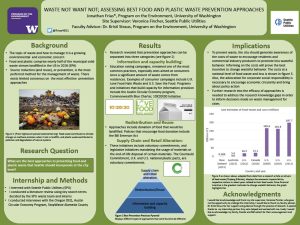Waste Not Want Not, Assessing Best Food and Plastic Waste Prevention Approaches
Waste is a prominent environmental issue that demands our attention. It is important to go beyond simply the management and diversion of waste and prevent it from being generated in the first place. I conducted research that served as the groundwork for developing a plan to be used to advise decision-making on ways to limit waste in Seattle; I looked at food and plastic waste in particular. The aim of my project was to develop a strategic plan for how to approach the prevention of waste at the city level by analyzing successful approaches on other levels and by other actors. For this internship with Seattle Public Utilities, I did a literature review using key search terms, and then interviewed representatives I was able to establish contact with from organizations or other entities. I found that there were a variety of approaches that were impactful and significant in preventing waste, depending on the type being assessed, from legislative action to consumer education. In my interviews with best practices candidates, I found that building partnerships with other departments and establishing communication can help to be an effective approach in attaining a circular economy. These results are significant as they indicate the most effective ways to subvert waste across industries and sectors. By promoting greater corporate responsibility, awareness and further research on prevention, this concern can be mitigated.
